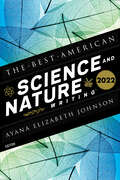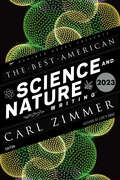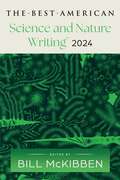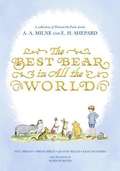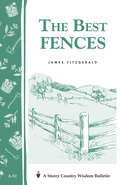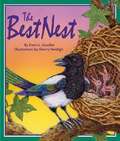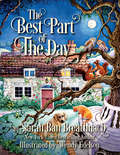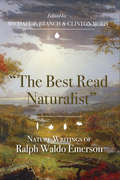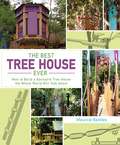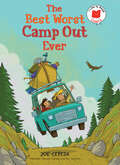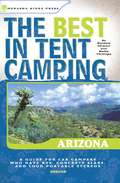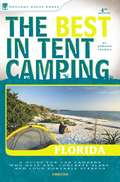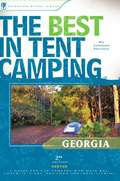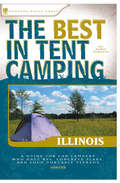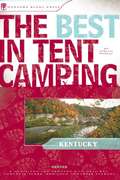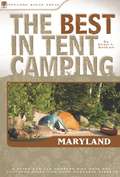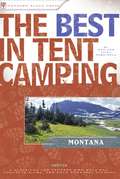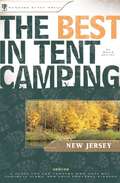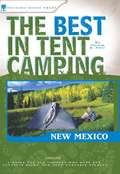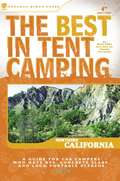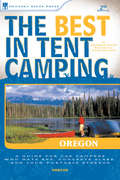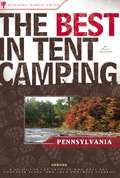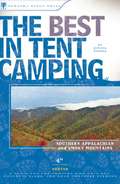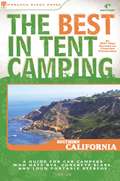- Table View
- List View
The Best American Science and Nature Writing 2022 (Best American)
by Jaime Green Ayana Elizabeth JohnsonA collection of the best science and nature articles written in 2021, selected by guest editor renowned marine biologist Dr. Ayana Elizabeth Johnson and series editor Jaime Green. Dr. Ayana Elizabeth Johnson, renowned marine biologist and co-founder of the All We Can Save climate initiative, compiles the best science and nature writing of the year.
The Best American Science and Nature Writing 2023 (Best American)
by Carl Zimmer Jaime GreenThe Best American Science and Nature Writing 2023 has descriptive copy which is not yet available from the Publisher.
The Best American Science and Nature Writing 2024
by Bill McKibben Jaime GreenAward-winning environmentalist, author, and journalist Bill McKibben selects twenty science and nature essays that represent the best examples of the form published in the previous year.“This was the most anomalous year (so far) in human history,” guest editor Bill McKibben writes, “the year in which the relationship between people and planet showed its most dramatic signs yet of unraveling.” The selections in The Best American Science and Nature Writing 2024 reveal a trying year for our planet—from the Lahaina wildfire tragedy to the lush Amazon jungle slowly turning to savanna—while also celebrating the earth’s beautiful and mysterious ways—from the largest beaver dam on earth to the heroic innovation to prevent birds from crashing into Chicago’s expanse of glass buildings. These essays offer solace in trying times, showing a way for a better future. They are, as McKibben says, “a reminder that this world is still a lovely and deep place, well worth the fighting for.”The Best American Science and Nature Writing 2024 includes IAN FRAZIER • AMANDA GEFTER • DOUGLAS FOX • SARAH KAPLAN • BEN GOLDFARB • RAYMOND ZHONG • ALEX CUADROS • AND OTHERS
The Best Bear in All the World
by Kate Saunders Paul Bright Mark Burgess Jeanne Willis Brian SibleyFor the 90th anniversary of Winnie-the-Pooh, a sequel featuring new stories and a new character from the Hundred Acre Wood. <P><P> Now a New York Times Bestseller. <P> The Trustees of the Pooh Properties have commissioned four authors to write in the timeless style of A.A. Milne to create a quartet of charming new adventures for Winnie-the-Pooh, Christopher Robin, and their friends. Winter, Spring, Summer, and Fall: take a trip back to the Hundred Acre Wood with a collection of tales sure to delight year-round.<P> One story finds Winnie-the-Pooh and Piglet on a quest to discover the "Sauce of the Nile" (they suspect it's apple). And in another, all the animals rally around poor Eeyore when he thinks he sees another donkey eyeing his clover. The winter story features a new penguin character, based on a stuffed toy owned by Christopher Robin Milne himself. Readers of all ages will love rediscovering old friends and making new ones in this essential new volume of Pooh stories.<P> The book features beautiful color artwork in the style of Ernest H. Shepard by Mark Burgess.
The Best Dog: Hilarious to Heartwarming Portraits of the Pups We Love
by Aliza EliazarovA gorgeous, heartwarming, and comedic collection of pup portraits and stories celebrating the enduring bond we share with our dogs, from acclaimed photographer, Aliza EliazarovCapturing animals&’ unique personalities with humor and grace for over a decade, Aliza&’s portraits have been exhibited and published widely, including on the covers of Modern Farmer magazine, BarkBox ads, and U.S. postage stamps. From couch potatoes to working dogs, Aliza takes us on a journey revealing the individuality of our loyal companions through dazzling photos and captions that illuminate the deep connection we have with our pets. You&’ll meet Frank, the bulldog who loves a tire; Maggie, the Jack Russell terrier who delivers homemade cookies to lobstermen; Eddy, the hero mutt who saved her farm from a fire; and many more soulful, funny, and downright adorable pups.With evocative portraits and hilarious observations of close to 100 dogs, The Best Dog will confirm what we already know—dogs really are the best.
The Best Fences: Storey's Country Wisdom Bulletin A-92 (Storey Country Wisdom Bulletin Ser.)
by James FitzgeraldSince 1973, Storey's Country Wisdom Bulletins have offered practical, hands-on instructions designed to help readers master dozens of country living skills quickly and easily. There are now more than 170 titles in this series, and their remarkable popularity reflects the common desire of country and city dwellers alike to cultivate personal independence in everyday life.
The Best Nest
by Doris L. MuellerLong ago, when the world was young, the magpies' nests were the envy of all other birds. To help the other birds, Maggie Magpie patiently explained how to build a nest. But some birds were impatient and flew off without listening to all the directions, which is why, to this day, birds' nests come in all different shapes and sizes. This clever retelling of an old English folktale teaches the importance of careful listening. All Sylvan Dell Books feature additional teaching activities including "For Creative Minds" that can be found at www. SylvanDellPublishing.com. Picture descriptions added.
The Best Part of The Day
by Sarah Ban Breathnach Wendy EdelsonIn her international bestseller Simple Abundance, Sarah Ban Breathnach inspired millions of women to find happiness in each day of their lives. Now Breathnach is back with her first children's book, The Best Part of the Day. Beautifully illustrated and lyrically written, this "good night" story encourages children to find at least one moment in each day that is worthy of celebration. The Best Part of the Day is the perfect addition to any family's nighttime routine.
The Best Read Naturalist": Nature Writings of Ralph Waldo Emerson (Under the Sign of Nature: Explorations in Ecocriticism)
by Ralph Waldo Emerson Michael P. Branch Clinton MohsRalph Waldo Emerson is one of the most important figures in American nature writing, yet until now readers have had no book devoted to this central theme in his work. "The Best Read Naturalist" fills this lacuna, placing several of Emerson’s lesser-known pieces of nature writing in conversation with his canonical essays. Organized chronologically, the thirteen selections--made up of sermons, lectures, addresses, and essays--reveal an engagement with natural history that spanned Emerson’s career. As we watch him grapple with what he called the "book of nature," a more environmentally connected thinker emerges--a "green" Emerson deeply concerned with the physical world and fascinated with the ability of science to reveal a correspondence between the order of nature and that of the mind. "The Best Read Naturalist" illuminates the vital influence that the study of natural history had on the development of Emerson’s mature philosophy.
The Best Tree House Ever: How to Build a Backyard Tree House the Whole World Will Talk About
by Maurice BarkleyWhen his two young grandsons clamored for a hideout in the trees, what could Maurice Barkley, a sixty-something retiree, do but grab some wooden beams and a level? Now, more than ten years, seven tiny houses, and a spiral staircase later, Barkley’s grandkids can truly say they have the best tree house ever. With a backyard that has become a tourist destination and the delighted cries of children playing pretend sounding in his ears, Barkley shares his pro building tips, floor plans, and how-tos in an easy-to-use guide anyone with a hankering for nature and a set of basic carpenter’s tools can follow.The Best Tree House Ever records the creation and growth of a child-sized village built high above the ground and documents the wonderful, unexpected consequences—the visitors, the excitement, and the hundreds of friendships made—that occurred along the way. Filled with plans and construction details of Barkley’s entire tree house village, The Best Tree House Ever leads adventurers of every age to explore the magical worlds hidden amongst the foliage.
The Best Worst Camp Out Ever (I Like to Read Comics)
by Joe CepedaA boy and his father go on a camping trip where everything goes wrong! Or does it? From Joe Cepeda, a Theodor Seuss Geisel and Pura Belpré Honor Winner, this early reader comic is perfect for first graders to read on their own!A boy and his father go on a camping trip! Despite one disaster after another, in the end, father and son agree it was their best weekend ever! Simple text and comic-book style illustrations support comprehension in this delightful book, ideal for first graders. Like the father in the book, Joe Cepeda is of Hispanic heritage and he loves going camping with his son.I Like to Read® Comics are perfect for kids who are challenged by or unengaged in reading, kids who love art, and the growing number of young comics fans. Filled with eye-catching art, humor, and terrific stories, these comics provide unique reading experiences for growing minds.We hope that all new readers will say, &“I like to read comics!&”
The Best in Tent Camping: Arizona
by Kirstin Olmon Kelly PhillipsFrom the saguaro cacti to the magnificent Grand Canyon, Arizona, long recognized for its roster of natural wonders, continues to be a destination for outdoor enthusiasts of every stripe. A study in contrasts, the state offers immense diversity in its landscapes - rocky geological formations, cool mountain streams, and deep reservoirs. The Best in Tent Camping: Arizona details the locations where travelers can best experience Arizona's incredible beauty. Amenities, price, elevation, restrictions, directions, and GPS coordinates are listed for each campground, and all locations are rated for beauty, privacy, cleanliness, and quiet.
The Best in Tent Camping: Florida
by Johnny MolloyCamping is one of life's great pleasures, and Florida has plenty to offer those who need a quick getaway. But how to find the best from the more than 1,000 choices in the state? The campgrounds in the fourth edition of this popular guide were chosen based on three criteria: they had to be accessible by car but not overrun by RVs; boast great scenery; and be as close to a wilderness experience as possible. Ranging from forest to swamp to coast, these sites are rated by a five-star system for beauty, noise, privacy, security, spaciousness, and cleanliness. Each profile provides essential details on facilities, reservations, fees, and restrictions, as well as an accurate, easy-to-read map. For native Floridians or out-of-state vacationers, this exhaustively researched guide makes it easy to find and enjoy the best tent-camping experiences in the state.
The Best in Tent Camping: Georgia
by Johnny MolloyWhether it's rafting down the Chattooga River, hiking along the Bartram Trail, or sea kayaking around Cumberland Island National Seashore, Georgia is chock full of opportunities for outdoor enthusiasts of all abilities. To help these adventurers on their way, The Best in Tent Camping: Georgia, 2nd reveals the best places in the Peach State to pitch a tent, from mountainous Amicalola Falls State Park, starting point for Appalachian Trail thru-hikers, to the windswept dunes of Cumberland Island. Written to steer campers away from concrete slabs and convoys of RVs, The Best in Tent Camping: Georgia, 2nd points tent campers to only the most scenic and serene campsites in the state.Painstakingly selected from hundreds of campgrounds, each of the 50 campsites is rated for: beauty, noise, privacy, security, spaciousness, and cleanliness. In addition, each campground profile provides essential details on facilities, reservations, fees, and restrictions, as well as an accurate, easy-to-read map, making the campground a snap to locate. Also included are suggestions for nearby outdoor recreation and sightseeing, pinpointing attractions that often go unnoticed.
The Best in Tent Camping: Illinois
by John SchirleFor the outdoor enthusiast, Illinois has it all: rivers to canoe, lakes to fish, trails to hike and bike, and plenty of quiet places to camp. This indispensable guide is aimed at the tent camper who wants to enjoy these things up close. Unlike other guides that merely list all campgrounds, The Best in Tent Camping: Illinois profiles in detail the 50 best sites in the state for campers who seek the serene and secluded. Here is essential information about each campground (including season, facilities, rates, directions, GPS coordinates, and websites), as well as a description of the campground, the best sites, and nearby activities such as hiking, canoeing, fishing, and mountain biking. The guide covers well-known parks as well as some campgrounds that are local secrets that can't be found on Internet searches.
The Best in Tent Camping: Kentucky
by Johnny MolloyPacked with lakes, rolling hills, and rugged bluffs, The Best in Tent Camping: Kentucky profiles the best campgrounds in the Bluegrass State. Whether it's camping in well-known destinations such as Mammoth Cave or the Daniel Boone National Forest or enjoying hidden gems such as the campsites at Wax, the scenery will not fail to please the eye. From Kingdom Come State Park with its incredible mountain views to Land Between the Lakes, a national recreation area, Kentucky spells paradise for tent campers.
The Best in Tent Camping: Maryland
by Evan L. BalkanMaryland's natural beauty can be fully experienced only by visiting, and what better way to do so than to pitch a tent in one of the varied locations Maryland has to offer: the Atlantic Ocean lies nearby, as do the Allegheny Mountains and the Chesapeake Bay. Maryland is a camper's dream, and this valuable guide assists outdoor enthusiasts of all stripes. Including a five-star rating system, detailed travel and contact information for each site, latitude and longitude coordinates, and regional maps, this guide is an incomparable resource for anyone roughing it in this beautiful state.
The Best in Tent Camping: Montana
by Ken Soderberg Vicky SoderbergThe Best in Tent Camping: Montana is the only guide to the best tent campgrounds Montana has to offer. The book includes campground layout maps, directions to each campground, and descriptive profiles.
The Best in Tent Camping: New Jersey
by Marie JavinsFrom the northern reaches of Stokes State Forest to the Atlantic coastal islands, camping in New Jersey has never been better. The Best in Tent Camping: New Jersey will guide you to the quietest, most beautiful, most secure, and best managed campgrounds in the Garden State.
The Best in Tent Camping: New Mexico
by Monte ParrVisiting New Mexico offers outdoor enthusiasts extensive options: canyons, deserts, mesas, mountains, rivers, lakes, and even ghost towns. Now, in this indispensable guide, the best campgrounds in and around these remarkable areas are rendered in full detail. Rated on beauty, privacy, spaciousness, quiet, security, and cleanliness, these campgrounds offer campers unparalleled southwestern beauty, and this guide - with its detailed maps, coordinates, and contact information - provides all the info readers need to access them.
The Best in Tent Camping: Northern California
by Cindy Coloma Bill MaiFrom Santa Cruz to Yosemite National Park, from the coastal bluffs to the Nevada border, Northern California is a spectacular location for tent camping. With such a staggering list of possibilities, a guide like The Best in Tent Camping: Northern California is a must-have. Offering at-a-glance information organized with a five-star rating system, the book lets outdoor enthusiasts quickly gauge the beauty, site privacy, and security of each listing. In addition, each write-up includes suggestions on the right time of year to visit, local amenities, and natural attractions. Whether pitching that tent in sandy beaches or the mountainous Sierra Nevada, this is the guide to consult.
The Best in Tent Camping: Oregon
by Paul Gerald Jeanne Louise PyleFrom rocky coastlines to sagebrush deserts, camping in Oregon has never been better. The Best in Tent Camping: Oregon guides tent campers to the state's quietest, most scenic and serene campsites. It's the perfect resource for those who blanch at the thought of pitching a tent on a concrete slab, trying to sleep through the blare of another camper's boom box, or waking up to find your tent surrounded by a convoy of RVs. The book contains detailed campground layout maps; key information such as fees, restrictions, and dates of operation; and candid ratings for beauty, privacy, quiet, security, spaciousness, and cleanliness.
The Best in Tent Camping: Pennsylvania
by Matt WillenBetween the state's two major population centers, Pittsburgh and Philadelphia, Pennsylvania offers the outdoor enthusiast thousands of square miles of hills, forests, and rivers to pursue a variety of outdoor activities--hiking, bicycling, skiing, fishing, boating, and camping. The Best In Tent Camping: Pennsylvania provides a guide to the fifty best places in the state to pitch a tent and spend the night without being bothered by the noise of loud portable stereos, large recreational vehicles, and crowds.In addition to providing campers with essential information about each campground (including season, rates, facilities, and how to reserve a site), the guide identifies the best sites at the best campgrounds, offers information on exciting day trips, suggests hikes and activities accessible from the campgrounds, and describes the flora and fauna campers might encounter on a trip.From the Pocono Mountain region to the Allegheny National Forest, the Laurel Highlands to the suburbs of Philadelphia, The Best in Tent Camping: Pennsylvania is an indispensable guide for the person who likes to sleep in a tent not far from the convenience of the car.
The Best in Tent Camping: Southern Appalachian and Smoky Mountains
by Johnny MolloyThe Great Smoky Mountains National Park attracts millions of people per year. The allure of the Smokies often overshadows special areas adjacent to the park. This book covers not only the Smokies, but also the highlands of eastern Tennessee, western North Carolina, northern Georgia, and western South Carolina. The only guide to the Smokies and Southern Appalachian's best tent camping features newly designed campground layout maps and UTM and latitude/longitude coordinates for each campground entrance. Descriptive text and ratings for security, quiet, and beauty make this new edition a must-have for every tent camper's library.
The Best in Tent Camping: Southern California
by Charles Patterson Bill MaiDesert camping in Death Valley? Check. Glacier camping in the Sierras? Check. That's Southern California for you - an area of staggering diversity and awesome natural beauty. With such a wide array of camping opportunities, The Best in Tent Camping: Southern California is an indispensable guide for bringing enthusiasts to their ideal campsite. Offering detailed profiles, at-a-glance information, campground maps, directions, and coordinates, this guide offers campers a truly comprehensive look at the best that the Golden State's southern region has to offer.
